
The 2000 United States presidential election was the 54th quadrennial presidential election, held on Tuesday, November 7, 2000. Republican Texas Governor George W. Bush, the eldest son of George H. W. Bush, narrowly defeated incumbent Democratic Vice President Al Gore. It was the fourth of five U.S. presidential elections, and the first since 1888, in which the winning candidate lost the popular vote, and is considered one of the closest U.S. presidential elections, with long-standing controversy about the result. Gore conceded the election on December 13.

The 1996 United States presidential election was the 53rd quadrennial presidential election, held on Tuesday, November 5, 1996. Incumbent Democratic President Bill Clinton defeated former Senate Majority Leader Bob Dole, the Republican nominee, and Ross Perot, the Reform Party nominee and 1992 Independent presidential candidate.
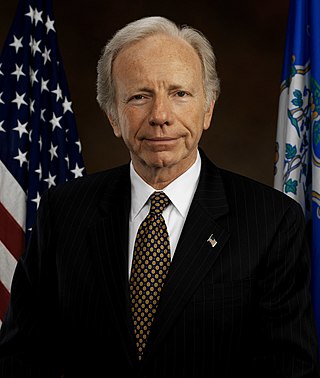
Joseph Isadore Lieberman was an American politician and lawyer who served as a United States senator from Connecticut from 1989 to 2013. A former member of the Democratic Party, he was its nominee for vice president of the United States in the 2000 U.S. presidential election. During his final term in office, he was officially listed as an independent Democrat and caucused with and chaired committees for the Democratic Party.

From February 10 to June 9, 1992, voters of the Democratic Party chose its nominee for president in the 1992 United States presidential election. Arkansas Governor Bill Clinton won the nomination through a series of primary elections and caucuses culminating in the 1992 Democratic National Convention held from July 13 to July 16, 1992, in New York City.
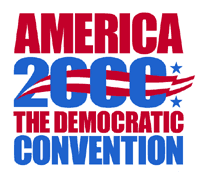
The 2000 Democratic National Convention was a quadrennial presidential nominating convention for the Democratic Party. The convention nominated Vice President Al Gore for president and Senator Joe Lieberman from Connecticut for vice president. The convention was held at the Staples Center in Los Angeles, California from August 14 to August 17, 2000. Gore accepted the presidential nomination on August 17, the final night of the convention.

The 2000 presidential campaign of Al Gore, the 45th vice president of the United States under President Bill Clinton, began when he announced his candidacy for the presidency of the United States in Carthage, Tennessee, on June 16, 1999. Gore became the Democratic nominee for the 2000 presidential election on August 17, 2000.
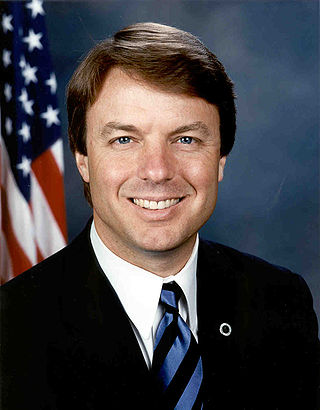
This article lists those who were potential candidates for the Democratic nomination for Vice President of the United States in the 2004 election. Massachusetts Senator John Kerry won the 2004 Democratic nomination for President of the United States, and chose North Carolina Senator John Edwards as his running mate on July 6, 2004. The Kerry–Edwards ticket would go on to lose the 2004 election to the Bush–Cheney ticket.

The 1992 Democratic National Convention nominated Governor Bill Clinton of Arkansas for president and Senator Al Gore from Tennessee for vice president; Clinton announced Gore as his running-mate on July 9, 1992. The convention was held at Madison Square Garden in New York City, New York from July 13 to July 16, 1992. The Clinton-Gore ticket then faced and defeated their Republican opponents, President George H. W. Bush and Vice President Dan Quayle as well as the independent ticket of Ross Perot and James Stockdale in the 1992 presidential election.
In United States politics, balancing the ticket is a practice where a political candidate chooses a running mate, usually from the same party, with the goal of bringing more widespread appeal to the campaign. The term is most prominently used to describe the selection of the U.S. vice presidential nominee.

Albert Arnold Gore Jr. is an American politician, businessman, and environmentalist who served as the 45th vice president of the United States from 1993 to 2001 under President Bill Clinton. He previously served as a United States Senator from Tennessee from 1985 to 1993 and as a member of the U.S. House of Representatives from 1977 to 1985. Gore was the Democratic nominee for president of the United States in the 2000 presidential election, which he lost to George W. Bush.

This article lists potential candidates for the Republican nomination for Vice President of the United States in the 2008 election. On March 4, 2008, Senator John McCain of Arizona won the 2008 Republican nomination for President of the United States, and became the presumptive nominee.
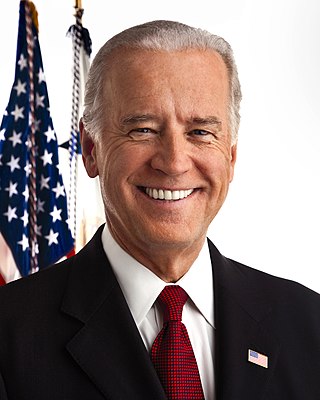
This article lists potential candidates for the Democratic nomination for Vice President of the United States in the 2008 presidential election. After Illinois Senator Barack Obama became the Democratic Party's presumptive presidential nominee on June 3, 2008, Obama formed a small committee, made up of James A. Johnson, Eric Holder and Caroline Kennedy, to help him select a running mate. Veteran Democratic lawyer and advisor James "Jim" Hamilton, of the firm Morgan, Lewis & Bockius, later replaced Johnson in vetting candidates.

From January 24 to June 6, 2000, voters of the Democratic Party chose its nominee for president in the 2000 United States presidential election. Incumbent Vice President Al Gore was selected as the nominee through a series of primary elections and caucuses culminating in the 2000 Democratic National Convention held from August 14 to 17, 2000, in Los Angeles, California, but he went on to lose the Electoral College in the general election against Governor George W. Bush held on November 7 of that year, despite winning the popular vote by 0.5%.

Bob Graham was a candidate for President of the United States in the 2004 Democratic Party presidential primaries.

The 2000 United States presidential election in California took place on November 7, 2000, as part of the wider 2000 United States presidential election. Voters chose 54 representatives, or electors to the Electoral College, who voted for president and vice president.

The 2000 United States Senate election in Connecticut took place on November 7, 2000 in conjunction with the 2000 U.S. presidential election, other elections to the United States Senate in other states, as well as elections to the United States House of Representatives and various state and local elections. Incumbent Democratic U.S. Senator Joe Lieberman won re-election to a third six-year term.

This article lists those who were potential candidates for the Democratic nomination for Vice President of the United States in the 1992 election. On June 2, 1992, Arkansas Governor Bill Clinton won the 1992 Democratic nomination for President of the United States, and became the presumptive nominee. On July 9, 1992, Tennessee Senator Albert Gore Jr. was chosen as his running mate.

This article lists potential candidates for the Democratic nomination for Vice President of the United States in the 2016 election. Former Secretary of State Hillary Clinton, the 2016 Democratic nominee for President of the United States, chose Senator Tim Kaine of Virginia as her running mate. The formal nomination took place at the 2016 Democratic National Convention. The Clinton–Kaine ticket lost the 2016 presidential election to the Republican Trump–Pence ticket, and Kaine returned to the Senate following the campaign.
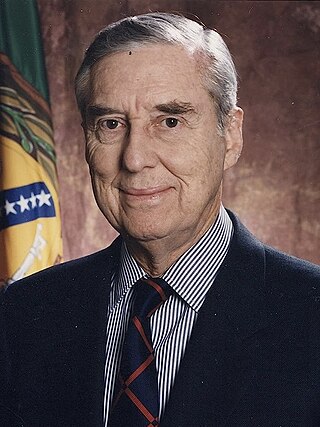
This article lists those who were potential candidates for the Democratic nomination for Vice President of the United States in the 1988 election. Massachusetts Governor Michael Dukakis won the 1988 Democratic nomination for President of the United States, and chose Texas Senator Lloyd Bentsen as his running mate. Dukakis chose Bentsen in order to appeal to Southerners and in hopes of carrying Bentsen's home state of Texas. The strategy failed, as the Dukakis-Bentsen ticket went on to lose Texas and all other states in the South except West Virginia. The choice of Bentsen caused some backlash from Jesse Jackson, who had wanted to be chosen as the vice presidential nominee, and progressives such as Ralph Nader. Paul Brountas, a longtime Dukakis aide, led the search for Dukakis's running mate. The Dukakis–Bentsen ticket would lose to the Bush–Quayle ticket in the general election. Bentsen simultaneously ran for reelection as Senator, and easily won, despite the Dukakis-Bentsen ticket's double-digit loss in Texas.

This article lists those who were potential candidates for the Democratic nomination for vice president of the United States in the 1984 election. Former Vice President Walter Mondale won the 1984 Democratic nomination for president of the United States, and chose New York Representative Geraldine Ferraro as his running mate. Ferraro was the first woman to be a part of a national ticket for a major party. Mondale chose Ferraro in hopes of energizing the base and winning the votes of women, but also because he viewed her as a solid legislator who had won the approval of Speaker Tip O'Neill. The Mondale–Ferraro ticket ultimately lost to the Reagan–Bush ticket. This is the last time the Democratic vice presidential nominee was not the incumbent vice president or a senator, and, not counting the times when the incumbent president was running for re-election, the last time the Democratic vice presidential nominee was not a senator.










































